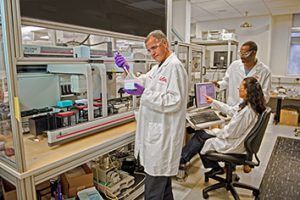How Eli Lilly CEO Lechleiter pulled company out of long slide
After weathering a barrage of patent expirations, the pharmaceutical giant has restocked its pipeline and is positioned to grow.
After weathering a barrage of patent expirations, the pharmaceutical giant has restocked its pipeline and is positioned to grow.

Novartis AG is racing to establish itself in the market for new treatments for psoriasis ahead of competing drugs by Amgen Inc. and Eli Lilly and Co. in the United States.
Eli Lilly and Co.'s drug Cyramza has been approved as a treatment for lung cancer, regulators said. The Food and Drug Administration is allowing Lilly to market the drug as a treatment for cases that have spread.
While the tests will likely help drug companies like Eli Lilly and Co. evaluate medicines, they’ll also create wrenching personal and ethical dilemmas for patients who will have to live with the knowledge that they’re destined to develop the disease.

If approved, Baricitinib may bring Lilly $673 million in 2020, according to the average of five analysts’ estimates compiled by Bloomberg.
Tabalumab was expected to generate about $250 million to $300 million a year in sales in several years.
The agency on Thursday cleared the drug, Trulicity, as a weekly injection to improve blood sugar control in patients with type 2 diabetes, which affects more than 26 million Americans.
The two companies will work together to develop AZD3293, which belongs to a novel class of drugs called BACE inhibitors that block production of amyloid, a protein that causes plaque to build up in the brain of Alzheimer’s patients.
Lilly is finally putting meat on the bones of its predictions about its experimental diabetes and cancer drugs. That gives investors the certainty they crave that Lilly’s future revenue won’t remain in its 2014 doldrums.
Lilly expects to soon announce late-stage clinical trial results for two biotech drugs designed to slow the inflammation caused by autoimmune diseases. By the end of the year, it will announce results for a third.
Founders of Chondrial Therapeutics believe that if further testing validates their treatment for Friedreich’s ataxia, it could be a blockbuster with annual sales topping $1 billion.
Results of a Roche clinical trial mirror those produced by an experimental Lilly drug two years ago. Lilly executives say that validates their approach in the multi-billion-dollar race to market the first drug to reverse Alzheimer’s.
A new research consortium spearheaded by the Indiana University School of Medicine and Eli Lilly and Co. could bring in $25 million to $50 million over five years to create a new approach for developing drugs that provide more precise treatment for small groups of patients.
Eli Lilly & Co. said its experimental insulin helped diabetic patients more than Sanofi’s biggest product in studies that also raised some safety risks.
Endocyte Inc.’s stock fell more than 60 percent in early trading Friday after the drug it’s developing with Merck & Co.’s backing failed to help patients in a trial for ovarian cancer.
Pfizer Inc., Eli Lilly and Co. and Novartis AG have dug an idea out of the pharmaceutical dustbin to create new medicines that are showing blockbuster potential.
Advisers to the Food and Drug Administration voted 13-1 and 14-0 that the drug, Afrezza, should be approved for Type 1 and Type 2 diabetes, respectively. The FDA doesn’t have to follow the panel’s recommendation.
Now that Indiana-based Endocyte Inc.’s experimental cancer treatment is proving successful, the company may command a takeover bid at one of the industry’s highest premiums on record.
Indianapolis-based Lilly is expected to garner $518 million in annual sales from Jardiance by 2019, according to the average of five analyst estimates compiled by Bloomberg.
Scientists have discovered that a gene-regulating protein that protects the developing brain of a fetus resurfaces in old age and may stave off dementia, a finding that could open a new path in Alzheimer’s research.